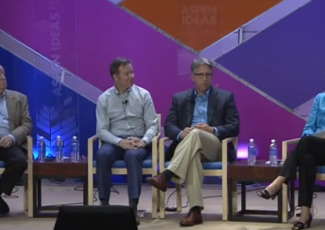Aspen Prize Nominee: Miles Community College
By Sarah Asp Olson
February 26, 2016
How one small Montana college focuses on support and engagement to ensure success in certificate and degree completion.
The Aspen Institute recently announced 150 community colleges eligible for the 2017 Aspen Prize for Community College Excellence. The prize recognizes community colleges that have achieved strong student outcomes in four primary areas: certificate and degree completion, student learning, employment and earnings, and success for minority and low-income students. While each eligible institution has proved its all-around excellence, we are introducing a series today that will look at member colleges with outstanding performance in one of the above areas. Here is the first installment.
Miles Community College (MCC), in Miles City, Montana, is small — just 506 students and 21 faculty members as of last fall. And while the college has its eye on growth, President Stacy Klippenstein looks at MCC’s small size as an advantage.
“We’re one of the smallest institutions on this Aspen award list,” Klippenstein says. “But the nice thing about that is it allows us to create that family and caring atmosphere.”
That atmosphere is one of the chief contributors to MCC’s above-average student-completion rates. For comparison, the average three-year graduation rate among the 150 colleges eligible for the 2017 Aspen Prize is 39.4 percent — nationally it is around 22 percent. MCC graduates 63 percent of its students within three years — and that’s not counting its popular short-term industry-valued credentials programs. MCC also boasts a 60 percent first-year retention rate.
We spoke with Klippenstein and Vice President of Enrollment and Student Success Jessie Dufner about what’s behind MCC’s success in both persistence and completion. They pointed to three primary areas:
- Giving students a strong start
Like many community colleges, MCC understands that getting students from fall to fall in their first year is extremely important.
All MCC students, from first-years to transfers, are required to attend a two-day orientation, during which they are introduced to representatives from different areas of student services, such as fitness facilities, dining services, the library and the tutoring center.
“It runs the gamut,” Dufner says, “but throughout the days, every student gets to hear from those people on campus. We go over policies, meet with advisers, go through setting up coursework through the next semester … and make sure that student is extremely prepared.”
From there, students can take the First Year Pioneer course, designed to get them comfortable on campus and set them up for academic and personal success.
“We also have college-success breakout sessions throughout the year,” Dufner says.
- Offering support along the way
Given MCC’s small size, it’s no surprise the campus has a close-knit feel to it. Dufner also attributes this to the fact that MCC is not a typical commuter campus.
“We’re a residential campus as well, so we do have residential halls,” she says. “I think that helps traditional-age students, wrapping those resources around them.”
Students also find strong support systems within their selected degree and extracurricular cohorts. Nearly one-quarter of MCC graduates come from the nursing department, and a good number of MCC students are athletes.
“Nursing [is] a very lock-step program,” Dufner says. “They have a lot of support from the nursing faculty, and they move through that program as a cohort. We have 110 athletes every year who cycle through. They [also] have those strong support systems built in. They study together, and they move through and graduate at a fairly high rate.”
Technical students, too, move through their training with the same group of students and a consistently small group of instructors who also serve as advisers, offering a sense of consistency and accountability.
- Focusing on engagement
The size and intimacy of the faculty help, but MCC has been intentional about creating strong engagement in and out of the classroom — and it shows.
Each year, the Community College Survey of Student Engagement polls institutions on five categories that determine the engagement level of the student population. “We’re above the national average and/or in the top tier group in four of the five categories,” Klippenstein says.






